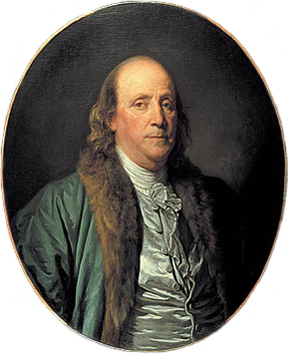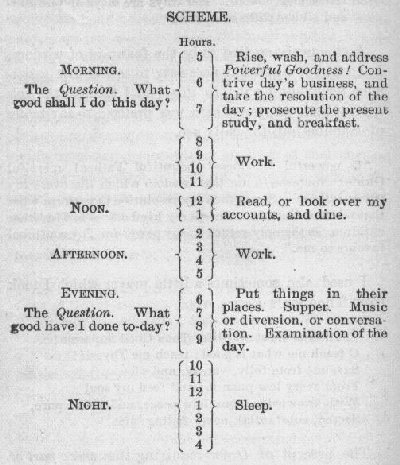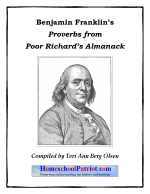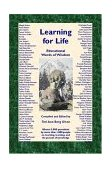

Benjamin Franklin:
“America’s First Great Man”
“Only here in America were common folk given a chance to show what they could do on their own without a master to push and order them about.” ~Eric Hoffer
Benjamin Franklin was the quintessential American, and the classic example of a self-made man. He strived to constantly improve himself and to accomplish his ambitions. Despite being born into a poor family and receiving less than two years of formal schooling, Franklin became a successful writer, inventor, and businessman. In his spare time he played chess, composed music, enjoyed swimming, experimented with electricity, helped found a country, and then served as its diplomat.
Benjamin Franklin was a great American patriot, the oldest and wisest of the Founding Fathers. The new country that was to become the United States relied on him to conduct matters with European countries because he was so well respected not only in America but also around the world. Franklin would have been a famous American even if he had not been a renowned statesman and diplomat. His wide-ranging skills and knowledge led him to invent a variety of things that are still in use today such as lightning rods, Franklin stoves, and bifocal eyeglasses. His inventions also included social innovations such as “paying it forward.”
Ben was born in Boston on January 17, 1706, the 15th child in a family of 17 children (four died at birth). His father made soap and candles, and although the family was not wealthy, they lived comfortably. When Ben was 8 years old, his father sent him to school, planning to have him become a minister. But by the age of 10, Ben had left school to work in his father’s shop. Despite his lack of formal education, Ben was highly self-educated. He taught himself grammar and arithmetic, read all of the books he could find, and learned how to write well, while also studying the arts of rhetoric and logic.
Since Ben liked reading more than cutting candle wicks, his father decided that he would make a good printer. At age 12 he was bound as an apprentice to his older brother James, who in 1721 had founded the New England Courant, the first independent newspaper in America that also included literary content and humorous essays. Ben asked his brother to give him money for buying books instead of giving him meat to eat. Franklin was interested in learning about many subjects including philosophy, electricity, physics, chemistry, meteorology, and oceanography.
While working as a typesetter, Franklin also wrote over a dozen articles for the Courant. He did not sign his real name but instead signed them “Mrs. Silence Dogood” and secretly slipped them under the door of his brother’s shop at night. These letters were well-received by the readers, but James was unhappy with Ben when he discovered the popular correspondent was his younger brother. Franklin ran away to Philadelphia where he arrived at age 17 with hardly any money, but he quickly found a printing job there.
After six years of hard work and saving money, Franklin was able to start his own printing business. He purchased The Pennsylvania Gazette and also published Poor Richard’s Almanac. Besides the calendar, weather, and astronomical information that a typical almanac of the period would contain, Poor Richard’s Almanac was filled with Franklin’s witty sayings and proverbs. This almanac became a best seller throughout the colonies, making him wealthy by the age of 42. Then Franklin sold his business in order to devote himself to study, and in a few years his scientific discoveries spread his fame to Europe.
As he matured, Franklin began to concern himself more with public affairs. He established the first public lending library. He started the Academy of Philadelphia, which later became the University of Pennsylvania. He founded the American Philosophical Society. He raised money for the first city hospital. He organized the first city fire department and the first city street-cleaning department. The idea of paving the streets of Philadelphia and having them lighted was also Franklin’s. Franklin served as Postmaster of Philadelphia and later became Postmaster General for all of the colonies.
Franklin became increasingly involved in politics and spent the rest of his life working for his country, first as an agent for the Colony of Pennsylvania and later as a member of the Continental Congress. In 1776, the year the Declaration of Independence was signed and the Colonies began calling themselves the United States of America, Franklin helped to make an agreement with France so that the French would help the Americans fight England for their freedom. He also got the French to lend money to the United States. The French people really liked Franklin because he was both wise and humorous.
After the American colonies won their freedom from England, Franklin returned to Philadelphia where he assisted in writing the Constitution of the United States. When the men from different states disagreed on how the government should be set up, Franklin’s clear thinking and good humor were useful in helping them to reach an accord. His ideas can be found in all four of the most important documents from the founding of the Untied States. These are the Declaration of Independence, the Treaty of Alliance with France, the Constitution of the United States, and the Treaty of Peace with England, each of which also contains Franklin’s signature.
Franklin died in 1790 at the age of 84, leaving a will in which he bequeathed money to various public causes. He was one of America’s most influential and famous Founding Fathers, even though he never served as President of the United States. Franklin’s legacy of scientific and political achievement has seen Franklin honored on coins and bills; in the names of many towns, counties, educational institutions, and companies; and countless references in popular culture.
Benjamin Franklin’s 13 Virtues
In 1726, at the age of 20, while on an 80-day ocean voyage from London to Philadelphia, Benjamin Franklin set his loftiest goal: the attainment of moral perfection. “I wish’d to live without committing any fault at any time; I would conquer all that either natural inclination, custom, or company might lead me into.” Franklin was partially motivated by Philippians 4:8 which states: “Finally, brothers, whatever is true, whatever is noble, whatever is right, whatever is pure, whatever is lovely, whatever is admirable--if anything is excellent or praiseworthy--think about such things.”
Franklin developed a plan for regulating his future conduct, which he followed faithfully for over sixty years. This plan included a corresponding chart of thirteen virtues, each with a short precept to explain its meaning. He committed himself to giving strict attention to one virtue each week. It would take thirteen weeks to go through all thirteen virtues. Then he would start over again so in one year he would repeat the process a total of four times. Every evening he would review the day and put a black spot next to each virtue for each fault committed with respect to the virtue of that day. His ultimate goal was not having to put any marks on his chart, thus indicating a “clean” life free of vice. Initially he found himself putting more marks on the chart than he wanted to admit, but in time he enjoyed seeing them diminish. “Tho’ I never arrived at the perfection I had been so ambitious of obtaining, but fell far short of it, yet I was, by the endeavour, a better and a happier man than I otherwise should have been if I had not attempted it.”
Download a replica of Franklin’s virtue chart so you can get started on living the virtuous life. Every evening, review your day and give yourself a mark if you transgressed the week's virtue. The goal is to live your days without having to place any marks on your chart.
See Also: a completely blank template, with only days of the week. You can print this out and write in your own virtues and descriptions or use it for tracking daily exercises, etc.
Benjamin Franklin’s Order of the Day
Franklin also created what may have been the original Day-Timer. “The precept of Order requiring that every part of my business should have its allotted time, one page in my little book contained the following scheme of employment for the twenty-four hours of a natural day.”

Download a replica of Franklin's Order of the Day chart based on his scheme of employment for the twenty-four hours of a natural day. Print this out and use it to organize your own day.
 Ben Franklin's Proverbs
Ben Franklin's Proverbs - We’ve all heard the advice "Early to bed, early to rise, makes a man healthy, wealthy, and wise." Benjamin Franklin had this to say and much more in Poor Richard’s Almanac. This e-book features over 100 of Ben's best proverbs, along with lined pages for children's copywork with appropriate quotes, additional lessons and writing assignments for all ages. Makes a great Language Arts unit study! Also great for penmanship practice!
Only $4.95!
References
Underground History of American Education, by John Taylor Gatto. Read online here: www.johntaylorgatto.com/chapters/1r.htm (A treasure trove of clues from which we can piece together the actual curriculum which produced an old man capable of birthing a nation.)
The Autobiography of Benjamin Franklin. Read it online: www.earlyamerica.com/lives/franklin (Much of what we know about Franklin comes from his Autobiography, the story of his life. Not only does it give important information for historians, but it is fun and easy to read. You might like to have America’s “first great man” tell you about himself.)
www.pbs.org/benfranklin/l3_wit_self.htm (Read about Ben Franklin and his emphasis on self-education, physical activity, and moral perfection.)
www.benjaminfranklin.org (A lengthy biography of Benjamin Franklin, with research links.)
www.csustan.edu/english/reuben/pal/chap2/franklin.htm (Benjamin Franklin - A Research and Reference Guide.)
www.imahero.com/readingprogram/patriotfranklin.html (Benjamin Franklin Study Guide.)
www.bfit.edu/aboutus/history.ph (History of the Benjamin Franklin Institute of Technology.)
www2.fi.ed (Founded in honor of Benjamin Franklin, The Franklin Institute is a museum in Philadelphia, Pennsylvania, and one of the oldest premier centers of science education in the United States. It also houses the Benjamin Franklin National Memorial.)
Subscribe to my Knowledge House Newsletter and get a famous homeschool biography once per month - plus a set of FREE e-books!
Click here for more details or to sign up.
Do you know of any famous homeschoolers or homeschool parents not listed here?
Contact: . Thanks! Please click here for reprint permission.


This website is a project of:

These pages are a continuous work in progress.
Copyright © 2000- by Teri Ann Berg Olsen
All rights reserved.









